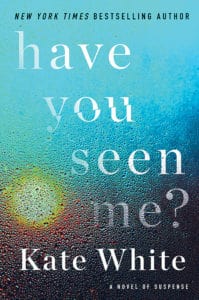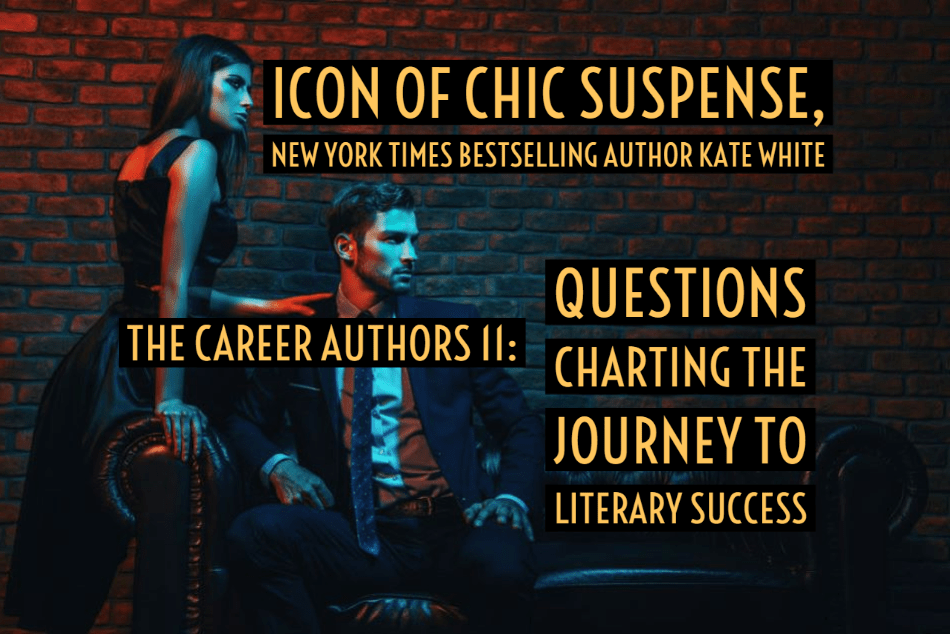Talk about a Career Author–Kate White is the absolute definition. Editor-in-chief at Cosmopolitan Magazine. Non-fiction author. Internationally acclaimed lecturer and teacher. New York Times Bestselling thriller and suspense writer. And a terrific cook with a wonderful family. How does she do it? She works all the time. But still has fun and glorious adventure. When you meet her, ask her how she and her husband just managed to catch the last plane out of Uruguay.
But today–she tackles our Career Authors 11.
1. What book changed your life?
Many books have had a huge, powerful effect on me, books like A Wrinkle in Time by Madeleine L’Engle, Catcher in the Rye by J.D. Salinger, The Dead by James Joyce, Wuthering Heights by Emily Bronte, This Side of Paradise, The Great Gatsby, and Tender Is the Night by F. Scott Fitzgerald, The Wide Sargasso Sea by Jean Rhys, The Sense of an Ending by Julian Barnes, and in popular modern fiction almost everything by Sue Miller.
But if I had to pick a book that actually changed my life, I guess I’d have to say The Secret of Redgate Farm by Carolyn Keene. Up until the time I discovered it at about age eleven in my grandmother’s bookcase, I’d read mostly biographies of famous Americans that weren’t particularly well written. Redgate Farm totally enthralled me. It showed me that reading the right kind of book could be a magical experience and it was going to be essential to seek out those kinds of books. And even more life-changing, it made me vow to write mysteries one day. I think Nancy Drew had that effect on many women!
2. Was your first published book the first manuscript you ever wrote?
Yes, but I had written chapters of other books before, which ended up going nowhere. When you’re starting out as author, it can be tough to realize you sometimes have to throw out huge chunks of material–pages you spent months working on–but you just have to tell yourself that it’s part of the process, and all those seemingly fruitless hours helped you hone your skills. Sometimes you can even go back and use little pieces of discarded material in a new book you’re writing. Bailey Weggins, the true crime writer in my mystery series, was a character in a women’s novel I made a stab at writing in my 20s. I liked her so much I resurrected her when I started writing suspense fiction.
3. Stephen King says, “The hardest part is just before you start.” What’s the hardest part of writing for you?
That’s not true for me. I love starting. It’s thrilling and exciting for me as long as I’ve done some prep work in advance and have a sense of where I’m headed. The hardest part for me is editing when I’ve saved way too much to go over rather than doing a little editing at a time. It can seem so overwhelming and frustrating for me. Not all that long ago, I heard the terrific thriller author C.J. Box speak on a panel and he said he always starts his workday by editing what he wrote the day before, and I’ve found that strategy (when I stick to it) really helpful. It’s so much easier for me to edit four or five pages a day rather a bunch of chapters all at once. I just read an interview with Harlan Coben and he follows this exact strategy, too. Wish I’d discovered it earlier!
4. Do you know the story’s ending before you start?
Yes, I always know the ending. I know who the killer is, the motive for the crime, and even some of the ways I’m going to try to disguise the killer. I know there are plenty of really successful authors who don’t plot their books out in advance. As you may have heard, they’re called pantsers (because they go by the seat of their pants). Besides the fact that I just wouldn’t want to be called a pantser in life (haha!), I have to be sure of where I’m going. Plus, knowing the outcome allows me to better weave in both clues and red herrings. In the Kirkus review for my new book, HAVE YOU SEEN ME? the reviewer said that I managed to use “some of our expectations [about domestic thrillers] to create clever dead ends,” and that meant so much to me because that’s what I’m always hoping to do. But I don’t think I could do it as well if I didn’t plot out my novels. That said, I plot loosely, so I still end up coming up with certain details and plot twists as I write, and that’s part of the fun of it. (Did I say fun? Yes, sometimes writing can be fun.)
5. When you’re having a difficult writing day, what do you tell yourself to get through it?
When I’m having a tough day and I’m a bit blocked, what I do is ask myself a bunch of questions, such as “How would the character know that?” or “What does she feel like doing next?” Years ago I met a woman named Laura Day who wrote a book called Practical Intuition, and she said that when we’re looking for creative input, it helps to put a request out to the universe in the form of a question, and wow, though I’m not very new age-y, that has been a beneficial technique for me. I even keep a notebook where I write questions down, and it’s amazing. Three second after writing the question, I’ll be writing the answer, like automatic writing or spirit writing. But it’s really only the subconscious answering back.
6. Do you read your reviews?
I’ve always been open to criticism. I ran Cosmopolitan magazine for fourteen years, and I’m proud to say that I took it to number one on the newsstand and kept it there during my entire tenure. A big part of how I was able to do that was to always look failure in the face (sometimes, if necessary, while drinking a glass of wine). I had my share of bombs and I studied those bombs, as painful as that could be. I never just told myself, “Hey tomorrow’s another day, move on.” Sometimes in life that really is a good philosophy, but in certain circumstances it’s important to understand why something failed and that includes a book that didn’t sell as well as you would have liked or might have generated less reader enthusiasm than others of yours. However, I’m not interested in a lot of nastiness. As all authors today know, there are plenty of readers who share really mean-spirited online reviews, knowing they’re anonymous. They would never have the nerve to say those same things to your face. So, I don’t bother with those, usually one-star reviews, but I I do look at some of the three-star reviews and often find that of value. The reviewer likes the book but might have a valid criticism, which I can learn from.
7. Besides being persistent and correcting your spelling errors, what’s your best advice for a new author?
My best advice is to write every single day, even if it’s only for ten minutes on the days you’re’ being audited by the IRS or having a tooth extracted. I saw recently that John Grisham advocated writing every day, and if he thinks it’s important, then, hey, who am I to disagree? People who tell me they’re starting a first novel generally have a day job, and they often admit they save their writing for weekends or vacation or even a writers retreat, but you’re not going to get any momentum doing it this way. I also think it’s helpful to not bite off more than you can chew in the beginning. Try writing for short stretches and then expand. That’s what I did, which made it harder to procrastinate. Once you get into the groove of writing every day, I believe it also can be smart to aim for a certain number of words rather than time on the clock. And here’s one more thing that comes from Ernest Hemingway. Just for the record, I didn’t know Ernest Hemingway. Ernest Hemingway was not a friend of mine. But I read that he said that it’s best to leave off each day at a part of the manuscript that you’re really liking so it’s easier to return to the book the next day.
8. What’s your definition of writer misery?
Misery for me is often the last few chapters because I’m so eager by then to just be DONE, and since I’m a slow writer, this part is agonizing.
9. What’s your definition of writer happiness?
An email from my editor saying she loves it and, even better, she loves it and only wants a few little changes!!! Of course, it’s also such a thrill when the book comes out, when readers say that you’ve kept them up at night reading. One of the most fun things for me was having someone write to me and tell me she named her baby girl Bailey after my character Bailey Weggins.
10. What’s your favorite book on writing?
I love Stephen King’s book On Writing: A Memoir of the Craft. It’s a must-read. I’ve found some of the popular books on screenwriting to be very useful, too. They teach you a lot about structure, how to get into your story quickly, and build excitement and conflict.
11. What book are you reading right now?
I’m reading State of Wonder by Ann Patchett because I realized after finishing the wonderful The Dutch House that I’d never read that one by her. As for mysteries, I’m just finishing Mary Kubica’s new mystery The Other Mrs. and I’m going to go back and reading Alex Marwood’s The Darkest Secret because it’s so darn good. I’m also re-reading “Macbeth” yet again along with critic Harold Bloom’s book on Shakespeare. Darn, Will was good, and he knew a LOT about murder.

Kate White is the New York Times bestselling author of fourteen novels of suspense: eight Bailey Weggins mysteries and six standalone psychological thrillers, including her most recent novel, Have You Seen Me? For fourteen years she served as the editor-in-chief of Cosmopolitan magazine. She is also the editor of the Mystery Writers of America Cookbook, a collection of recipes from the field’s top-selling authors. Kate is a frequent speaker at libraries and conferences and loves to share her journey from magazine editor to suspense novelist in a talk called “On Becoming an Author: Forging a New Creative Path and Finding Winning Ideas All Around You.” In addition to writing mysteries and thrillers, Kate is the author of several best-selling career books, including The Gutsy Girl Handbook: Your Manifesto for Success, as well as I Shouldn’t Be Telling You This: How to Ask for the Money, Snag the Promotion, and Create the Career You Deserve. She lives in New York City.
of Cosmopolitan magazine. She is also the editor of the Mystery Writers of America Cookbook, a collection of recipes from the field’s top-selling authors. Kate is a frequent speaker at libraries and conferences and loves to share her journey from magazine editor to suspense novelist in a talk called “On Becoming an Author: Forging a New Creative Path and Finding Winning Ideas All Around You.” In addition to writing mysteries and thrillers, Kate is the author of several best-selling career books, including The Gutsy Girl Handbook: Your Manifesto for Success, as well as I Shouldn’t Be Telling You This: How to Ask for the Money, Snag the Promotion, and Create the Career You Deserve. She lives in New York City.





